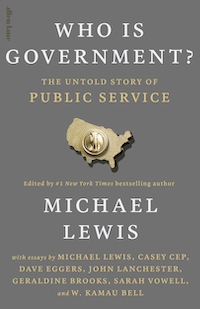Public ideas
Who is government?

What happens when a right-wing ideologue in DOGE sacks the inspectors who monitor and enforce mining standards?
The consequences aren’t hard to work out, and America is going through that experiment at present.
That is one of the cases Jon Stewart on his Weekly Show, discusses with Michael Lewis, author of Who is government?.
Not “what is government?” but “who is government?”, because Lewis talks and writes about individual public servants. The public servant whose work on ocean currents saved lives, the public servant who did life-saving work that pharmaceutical firms found to be unprofitable.
In telling their stories Lewis is doing for public servants what they aren’t doing for themselves – letting the public know what public servants do and how their work affects so many lives.
The work of the public service is modest. There is nothing performative about it. It has therefore been easy for the stereotype of the lazy public servant to fill this place in the public imagination, as it is for the idea “if you’re in the public service it must be because you couldn’t get a job in the real economy” to gain traction. That’s why it has been such a simple task for Trump and other deep state conspiracy theorists to talk about the public service as an evil force working purposefully to subvert the nation.
The discussion touches on the expectations we have of public servants. We are much more forgiving of underperformance in the private sector than we are of underperformance in the public sector. That’s why we tend to cripple public agencies with too many layers of audit, efficiency drives, and similar mechanisms, adding to bureaucratic costs and stifling creativity.
Lewis echoes Herman Leonard’s aphorism “The hard jobs are left to the public sector”. These are jobs that won’t turn a profit, like providing broadband for remote communities, or matching rare diseases with rare medications.
Of course the stories are American, but they relate closely to Australia. Dutton, like Trump, has his DOGE, and still plans to let go 40 000 public servants: it’s just that he would take longer than originally planned. Angus Taylor was unchallenged in Tuesday night’s debate, when he said that for there to be real growth in the economy the private sector had to grow faster than the public sector. That doesn’t appear in any respectable economics or public administration textbook. It’s a Taylor fabrication, based on the idea that nothing of value comes from the public sector – pure Trumpian.
It’s a long session – 80 minutes – but along the way you will learn about the brain disease Balamuthia, gothic cathedrals, and the fate of obese cruise-ship passengers who fall overboard.
On leadership (not “leaders”)
The Age’s Chip Le Grand has a long article – an essay really – headed He’s careful, stable – even prosaic. But Albanese may just have nailed the mood. You may find it’s paywalled, but the headline is a good summary.
His final paragraph describes Albanese’s political style:
Albanese is not promising to do politics a different way. His re-election will not usher in an era of dizzying reform. His essential offer is considered, dependable government in increasingly crazy times. It is not exciting but it may be enough.
It’s a style that frustrates many of Labor’s supporters and others who want to see more progress on our pressing problems. But as Le Grand suggests, Albanese may have gone as far as he can go in a world that has been turning to right-wing populism, and in a country where the opposition leader is bound by no consideration of the truth, the national interest, or the conventions of civilized discourse.
The essay addresses the question whether “Albanese can provide the leadership Australia needs”, and Le Grand answers in the affirmative.
Note that it’s about leadership. That’s the hard work of mobilizing people’s resources to make progress on difficult problems involving adaptive change, to use the terminology of Ron Heifetz, Professor of Leadership at Harvard’s Kennedy School. It’s not about standing up in front of the crowd and saying “I am your leader, and I have solutions to your problems”.
The work of leadership requires patience, and attention to pacing. Move too fast and the people will revolt – remember what happened to Whitlam? Perhaps Albanese is moving close to the speed limit.
Le Grand’s essay is neatly complemented by David Brooks’ essay in The Atlantic I should have seen this coming. Brooks describes himself as a conservative who saw the conservative movement splitting into two camps – one upholding conservative values, and the other which embarked on a crusade to achieve power and domination over others, not to promote some ideology, but as a quest to achieve power for its own sake. And he understands how that power works:
I understand why people who feel alienated would want to follow the leader who speaks about domination and combat, not the one who speaks about healing and cooperation. It doesn’t matter how many times you’ve read Edmund Burke or the Gospel of Matthew—it’s still tempting to throw away all of your beliefs to support the leader who promises to be “your retribution.”
That’s the power of the “leader”, not the power of the person who is quietly engaged in the hard work of leadership.